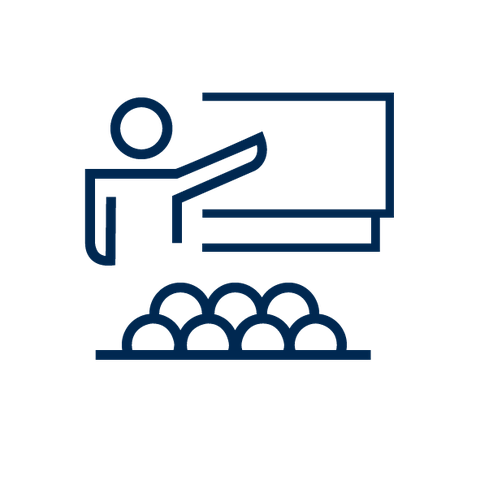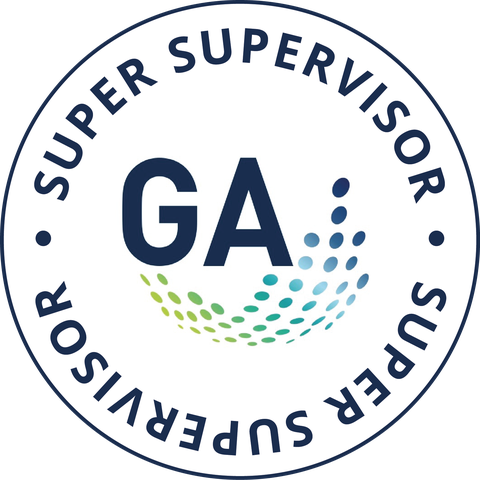Good Doctoral Supervision
Completing a dissertation is an independent academic achievement that is supervised and mentored by an experienced scientist. The quality of supervision is essential for the success of a doctorate. Providing the right level of support and encouragement to doctoral candidates is, therefore, one of the most critical tasks of university lecturers.
The basis for a constructive working relationship is open and transparent communication, as well as mutual respect and trust.
Therefore, every doctoral candidate at TU Dresden is supported by a supervisory team - see § 4 (5) of the Statutes for Safeguarding Good Scientific Practice).
The Graduate Academy offers you a wide range of programs on the topic of "Good Doctoral Supervision,” designed to provide both supervisors and doctoral candidates with the best possible professional support.
Information and Programs of the Graduate Academy for:
Finding the “right one”
Professional expertise will obviously play a decisive role when it comes to finding a supervisor.
The homepage, list of publications, and research projects are good points of reference.
Moreover, "softer" factors also play an essential role, especially the question of whether the supervision approach meets your specific expectations and needs.
The following questions can help you in your search and decision:
- Is there an ideal research environment for my doctoral topic?
- Are there appropriate networks in which I can be included?
- Does the professorship offer colloquia and seminars for doctoral candidates?
This indicates systematic and reliable supervision. - How long did completed doctorates usually take?
- Have they ever won the Graduate Academy's Award for Outstanding Doctoral Supervision?
- It's also worth taking a look at (successfully) completed doctorates.
- Discussions with former or current doctoral candidates can also be helpful.
Assistance in finding a supervisor may also be found at
The Supervision Agreement
To ensure that the doctoral project can be completed within a reasonable period, mutual expectations, rights, and obligations, as well as the form and scope of the work, should be discussed and documented in writing at the beginning of your doctorate with the guidance of the supervision agreement.
Workshop on the Supervisory Relationship
Having a constructive supervisory relationship is critical to the success of your doctorate.
Our workshop on the Supervisory Relationship within our PhD Starter Kit addresses how you, as a doctoral candidate, can play a constructive role in shaping the supervisory relationship.
As part of our qualification program for doctoral candidates, the Ph.D. Starter Kit is held in English during the winter semester and German during the summer semester.
How to deal with conflicts?
Conflicts are a part of life and can naturally happen in everyday situations with your supervisor.
In workplace-specific conflict situations, the Graduate Academy provides you with conflict counseling and mediation.
Please make an appointment by emailing graduiertenakademie@tu-dresden.de.
Further contacts in case of conflict at TU Dresden
There are other points of contact for doctoral candidates and postdocs at TU Dresden that you can contact confidentially in the event of a conflict. These include
- Ombudspersons of the Faculties (in German only)
- Ombudsperson of TUD
- Conflict Mediators
Doctoral researchers play an essential role in research. Often, this also involves the co-supervision of doctoral candidates. This might be challenging because the learning processes take place on several levels: in science, in communication, in collaboration, etc.
It is helpful to reflect on how to supervise and develop doctoral researchers in a way that enables them to produce the best possible results and to become independent researchers.
We offer the following two-day workshop on a regular basis as part of our qualification program for postdocs to support you in this crucial role.
Workshop | Co-Supervision for Postdocs
Contents of the Workshop
- Recruitment: How do you find and select doctoral researchers?
- How do we clarify one's expectations and criteria, and how do we bring them in line with the expectations of doctoral researchers?
- How do we develop doctoral researchers, and how do we enable them to be independent?
- Feedback as a fundamental instrument: How do you give motivating feedback and learn from doctoral researchers' feedback as a supervisor?
- Demotivation and setbacks: Ways to support doctoral researchers during typical challenges.
- How to deal with conflicts and difficulties?
- What are typical difficulties of doctoral researchers, and what does this mean for supervisors and how to overcome them?
- Grading of the dissertation.
- Common mistakes of co-supervisors and how to avoid them.
Individual Coaching Sessions
The optional coaching session gives you the opportunity to talk about topics of individual interest. Appointments will be made at the end of the workshop.
One of the most critical tasks of university lecturers is supporting and promoting doctoral candidates to the proper extent. The successful completion of a doctorate is an important milestone for both the doctoral candidate and the supervisor.
Selection of Doctoral Candidates
Good supervision begins with the right choice of doctoral candidates. A reflective examination of your supervision style is essential:
- How much time can you spend on supervision, and do you want to spend it?
- Does the topic belong to an area that fits your research profile or broadens it?
- Do you specify the topic, or do you accept suggestions from the doctoral candidate?
- Do you ask for an exposé in advance, on the basis of which you decide whether to accept it?
- Does your supervision style suit the doctoral candidate, or are there expectations that you cannot or do not want to fulfill?
Criteria for good supervision are:
- Sufficient time should be given to supervising an appropriate number of doctoral candidates
- Regular exchange between supervisors and doctoral candidates (e.g., in personal discussions, working group meetings, etc.) and feedback on the results achieved
- Joint drafting of a research and development plan
- Reasonable time planning so that the doctorate can be completed within a reasonable time (usually three years)
- instruction of the requirements for good scientific practice
- Supporting the (interdisciplinary) qualification of doctoral candidates
- Supporting doctoral candidates in their integration into the scientific community and actively promoting their involvement in national and international networks
Supervision Agreement
The requirements and agreements are defined in the joint supervision agreement at the outset of the doctoral project. Writing down the mutual expectations, rights, and obligations, as well as the form and scope of the work is intended to ensure that the doctoral project is completed within a reasonable time frame.
Workshop | Doctoral Supervisor Training
Our two-day in-depth workshops, which are usually held online, are directed at professors and TUD Young Investigators from all disciplines.
We aim to support the participants in selecting doctoral candidates based on relevant criteria to provide even better supervision.
► Doctoral Supervisor Training 2026 | Save the Date & Register Now!
Contents of the Workshop
Day 1 | Preparing supervision — developing and reflecting on your supervision concept
- What is good supervision of doctoral candidates?
- The doctorate is a learning process — making the learning process visible and structuring it.
- How do I want to supervise? Clarify your expectations and include them in the process.
- Closeness and distance, support and personal responsibility: reflecting on the advantages and disadvantages of different supervision concepts.
- Selecting doctoral candidates on the basis of your expectations.
Day 2 | Supervision practice — from the supervision agreement to feedback to conflict resolution
- Starting point: clarifying expectations together
- The supervision agreement is a way of clarifying expectations
- Onboarding and developing collaboration
- Designing feedback and meetings
- Dealing well with conflicts and motivation problems
Methods
Introductory presentations, group work, self-reflection, exchange of experiences
Would you like to take part in the next workshop?
Please get in touch!
Guidelines for Safeguarding Good Research Practice
These 19 guidelines describe appropriate standards for scientific work and provide practical comments (see particular guidelines 3 and 4).
Guidelines on Safeguarding Good Research Practice (DFG)
Principles of Effective Career Support in Academia
In these ten principles of adequate career support in science, the DFG summarizes how the framework conditions for researchers in early career phases — primarily doctoral and postdoctoral researchers — should be designed.
Principles of Effective Career Support in Academia (DFG) (in German only)
The Supervisory Relationship
- Doctoral Supervision. Recommendations and good practice for universities and doctoral supervisors (UniWiND)
- A beginner’s guide to supervising a PhD researcher
Guidelines of the „Qualitätszirkels Promotion”
- Shaping a Doctorate Together”- Guidelines for Doctoral Candidates
- Shaping a Doctorate Together”- Guidelines for Supervisors
DocEnhance | Online Course on PhD Supervision
This online course from DocEnhance consists of videos, basic reading material, working materials for peer groups, and exercises. It can be tailored to the needs of different target groups (beginners, supervisors, more experienced or mixed groups, or even supervisors from the industry).
Award for Outstanding Doctoral Supervision at the TUD
Since 2017, the Graduate Academy has been awarding an annual prize for outstanding doctoral supervision in order to raise awareness of the importance of good doctoral supervision.
In fact, TU Dresden was one of the first universities in Germany to establish such an award.
Time and again, the numerous nominations, as well as the personal laudatory speeches by doctoral candidates and postdocs, impressively demonstrate that outstanding work is already being done at TU Dresden.
► Doctoral Supervisor Training 2026 | Save the Date & Register Now!
Doctoral Candidate Survey 2021
A survey of young academics confirms this. In spring 2021, TU Dresden took part in the National Academics Panel Study (Nacaps), the significant long-term study of doctoral candidates and postdocs, for the first time.
The results speak for themselves: Satisfaction with supervision is higher among doctoral candidates at TU Dresden than the national average.
A good 70 percent of the doctoral candidates surveyed said they were (very) satisfied with their supervision.






